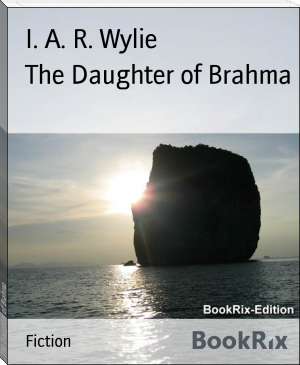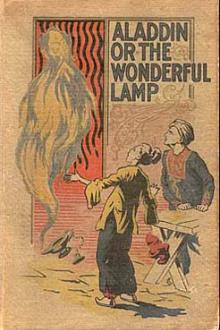The Daughter of Brahma - I. A. R. Wylie (ereader iphone .TXT) 📗

- Author: I. A. R. Wylie
Book online «The Daughter of Brahma - I. A. R. Wylie (ereader iphone .TXT) 📗». Author I. A. R. Wylie
The judge looks desperately ill, and is not so cheerful as of old, but he clings heroically to his part whatever that may be.
"And now you have all my news in a nutshell. Write to me and tell me about your wife. Do not give her my love one does not present such commonplace offerings to a princess out of fairy-land but tell her, and above all, remember, if she needs a woman to help her, as only a woman can, against the backbitings of your enlightened neighbours, I will come by the next boat. I am spoiling for a fight. Good-bye, and take my advice: follow the example of your namesake, and smite the Philistines another glorious blow. By the way, was Goliath a Philistine? I have forgotten. At any rate, your Goliath is a very respectable person called Brown, or Robinson, or even Morell, and by his righteousness shall you know him. And so farewell.
"Your affectionate
"DIANA CHICHESTER.
"P.S. By the way, Mr. Eliot's convert,Rama Pal, has disappeared. It is said that he has gone to England, but with what means no one knows. Professor Heilig has an idea and his ideas are usually good that our young Christian brother was closely connected with last year's little excitement, or at any rate, with the Brahmans who started it. The Professor has asked me to warn you to keep out of his way, as he would undoubtedly recognise your wife, and no one knows what course he might take. I have only allowed myself one postscript, but you see it is an important one."
For some time after he had finished reading Hurst sat quietly gazing into the fire. What he saw there he himself did not know, but he was conscious that, out of the restless changing flames pictures were struggling to form themselves against his will and desire. Presently he looked up. The great oil-painting which hung over the mantelpiece attracted his attention. Until now he had scarcely noticed it. A typical old family portrait, it had little enough to recommend itself to any but the confirmed ancestor-collector, and hitherto Hurst had thrust the throught of his family resolutely out of his life. Through the early years of his boyhood he had listened to veiled, half unconscious comparisons, and out of his suppressed bitterness had grown up a sullen hatred for those heroes whose glorious mantle had been flung upon his unworthy shoulders. He hated them, as he might have hated living enemies; when he passed through the long hall, lined with their portraits, he felt that they stared at him from their high places in cold contempt, and, like an outsider, striving to mask his wounded pride with indifference, he passed them by unnoticed. But to-night he studied this faded picture until the sunken colours regained their original brightness, and the face and figure stood out against the sombre, unreal background of a poorly conceived battle-field with all the plastic clearness of life. The portrait represented a colonel in the Indian Army of fifty years ago. The quaint uniform, the stiff, uncompromising pose of the tall, square-shouldered figure, suggested nothing very heroic, but the face arrested and held Hurst's attention. Poor craftsman though the artist had been, he had managed to catch a glimpse of his subject's individuality. The dark, sombre features revealed the man of action, the eyes the dreamer and the idealist. They stared down at the man by the fireside, and gradually it seemed to him that they lost their expression of grave, unchanging condemnation, and became alive with a significance and look of appeal and unsatisfied desire which was painfully familiar.
Hurst passed his hand over his own eyes and then remembered. The memory forced an audible laugh from his lips. Between the Sir David of these brave days and the Sir David Hurst of now there was a gulf which no flattering but fancied resemblance could bridge. Hurst sprang impatiently to his feet, and suddenly became aware that Sarasvati's eyes had never left his face.
"Your letter has brought you trouble," she said gravely. He shook his head and laughed again with sincere light-heartedness.
"How could it, dear? Nothing that happens in a world outside my own can affect me very closely. Would you like me to read the letter to you?"
"Might I try to read it myself?" she asked shyly. "I think if I touched her letter I should feel her nearer to me."
He handed her the folded sheets without answering. Her unaffected attachment to the Englishwoman who had befriended her touched him and drew her closer to him. For there is nothing we value so much in those dear to us as their appreciation of our friends, and justly, since it is an appreciation of ourselves and our innermost needs. Hurst sank back into his chair and watched his wife as she read. She read slowly, for the Latin letters had always been a stumbling block in her intellectual progress, and he knew by her eyes that one or two sentences were returned to with an unsatisfied inquiry. When she had at last finished she did not look at him, but at the portrait above the mantelpiece. There was a moment's silence, then she came to him and laid the letter gravely in his hand. "Our friend is wise and good," she said. "She loves you well, husband."
"Loves me! "Hurst echoed. "Why, Sarasvati, Diana and I were children together, we played together, we grew up together. Which fact does not prevent her looking upon me as a very inferior sort of individual whom she takes an interest in for the sake of old times that is all." He looked up smiling into his wife's dark and lovely face, but still her eyes were fixed on the old portrait, and she shook her head.
"She writes because she fears for you," she said. "Does a woman do that who does not love?"
"You do not understand Englishwomen such as Diana Chichester," he returned. "You cannot understand friendship between a man and a woman."
"Friendship between a man and a woman?" she repeated thoughtfully. "Can that really be?"
He got up to disguise a sudden impatience. Her unconscious wisdom, born of an elemental simplicity of feeling, startled him to a sense of danger. He looked at her and saw that she was standing in an attitude of childish wonder, her hands crossed upon her breast as he had often seen them. This momentary impatience passed. Before her absolute sincerity he was conscious of a rising remorse, a sudden recognition of his own disloyalty. With no other woman would he have counted himself disloyal. The tacit understanding that neither is of necessity the first in the other's life is usually included in the marriage contract, and the woman who honestly believes herself a unique episode may be counted a Victorian curiosity. But David Hurst's wife had been brought straight into the world from an incomparable solitude. For her, love was simply this one man. Could she be made to realise that for him there had been another woman? and, if she realised it, would it not break her heart? David Hurst became afraid, and the confession which had risen to his lips was held back. He came to her side and took her hands gently in his.
"Friendship between men and women exists," he said. "It exists between Diana and myself. Had we not proof of it in those days at Kolruna?"
"Yes," she answered simply, "but I did not know that that was friendship."
They said no more. At that moment the door of the library had opened and the butler, followed directly by a short, wiry individual in a tremendous overcoat, entered the room. The butler apologised with a gesture which eloquently described his inability to cope with the situation.
"If you please, Sir David, this this gentleman--"
"Smith is my name," came the interruption from the unexpected visitor. "It is not an unusual name, but well known in these precincts. Permit me to give you my card, Sir David." He bustled forward and laid a piece of white pasteboard on the table, then performed a ceremonious bow, addressed this time to Sarasvati. "I am quite aware that I am intruding," he went on, with a gesture that finally dismissed the butler, "but it is well known that visitors who try the ordinary way are not received, and my business is important enough to justify any means, good or bad. I hope I am excused?"
"That depends," Hurst returned. "Judging by ordinary standards, I should call this--"
"--an impertinence," finished the little man, with the greatest amiability, "Quite right, Sir David. It is an impertinence, but impertinence is my best stock-in-trade it belongs, in fact, to my business. I simply couldn't get on without it. In a word I am a politician."
He brought out the word with a gravity which was denied by the twinkle in his small bright eyes, and then went on, without giving his unwilling host any opportunity to speak: "I want half an hour of your time, Sir David. I claim it not on my own behalf, but on the behalf of your country. It would be a charity to listen to me. Are you a patriot?"
"It depends on your definition of patriotism," Hurst returned, with increasing amusement.
"Patriotism," said the little man, and rubbed his chin, "is a supreme admiration for yourself and an equal contempt for your neighbour--that is, in the ordinary way. At election time, however, it becomes 'the noblest emotion burning in the heart of man.' Personally, I call it a reasonable desire to keep one's own house in order."
"Then I am a patriot," Hurst admitted.
"May I sit down?"
"By all means--have you any objection to Lady Hurst taking part in this interesting interview?"
"On the contrary--" another deep bow "Lady Hurst's presence is most necessary, I might say essential. A man in my position depends more on the ladies than any one else." He seated himself stiffly hi the chair to which he had been motioned, and undid his overcoat. "And now, may I get to business?"
"I should be grateful."
"In the first place," said Mr. Smith, referring to a notebook, "I should like to mention that I am a member of the Unionist Association of the Division, and that for the last ten years I have served the Hurst family as electioneering agent and general business man. You know, of course, that the late baronet was a Member of Parliament?"
Hurst bowed.
"You are also aware, perhaps, that we are on the eve of a general election. The seat will be strongly contested by a Socialist and a Liberal candidate, who fancy the situation favourable for knocking down our majority. Unless we can find a man who can count on all the old voters, we are bound to lose in a threecornered contest. That is our position, Sir David. We must have a good man, and a popular man and, frankly, the only one we can think of is yourself."
Hurst started





Comments (0)